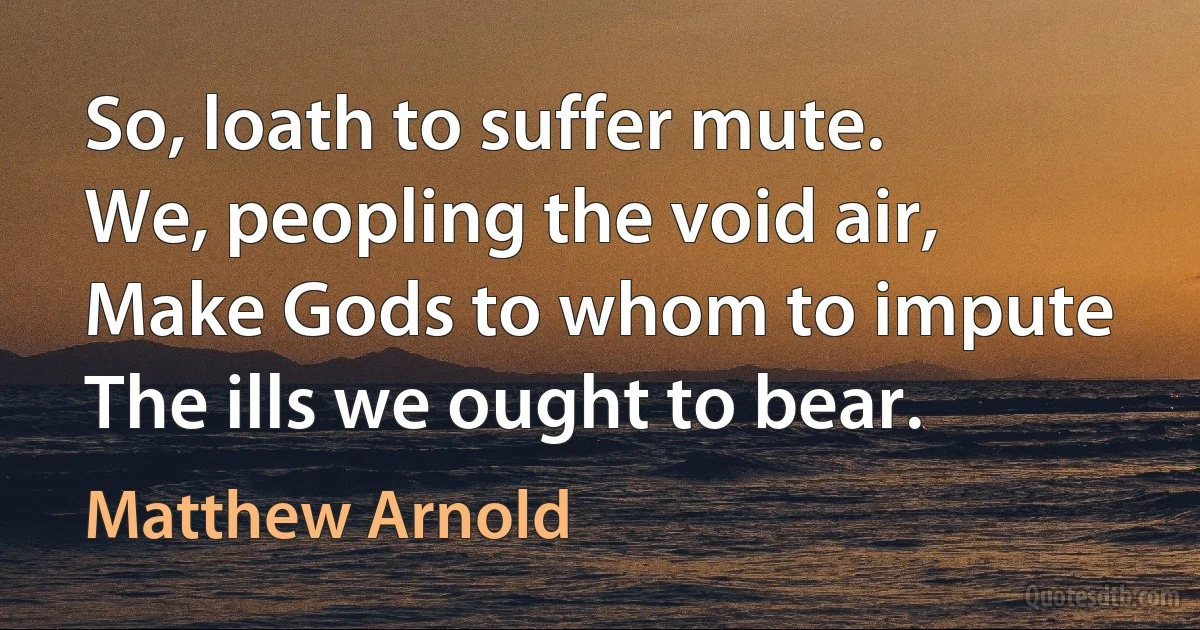Void Quotes - page 6
You strip from me the laurel and the rose!
Take all! Despite you there is yet one thing
I hold against you all, and when, tonight,
I enter Christ's fair courts, and, lowly bowed,
Sweep with doffed casque the heavens' threshold blue,
One thing is left, that, void of stain or smutch,
I bear away despite you ...
My panache.

Edmond Rostand
We have in fact only two certainties in this world-that we are not everything and that we will die. To be conscious of not being everything, as one is of being mortal, is nothing. But if we are without a narcotic, an unbreathable void reveals itself. I wanted to be everything, so that falling into this void, I might summon my courage and say to myself: "I am ashamed of having wanted to be everything, for I see now that it was to sleep.” From that moment begins a singular experience. The mind moves in a strange world where anguish and ecstasy coexist.

Georges Bataille
Although a poem be not made by counting of syllables upon the fingers, yet "numbers" is the most poetical synonym we have for verse, and "measure" the most significant equivalent for beauty, for goodness, and perhaps even for truth. Those early and profound philosophers, the followers of Pythagoras, saw the essence of all things in number, and it was by weight, measure, and number, as we read in the Bible, that the Creator first brought Nature out of the void.

George Santayana
They came, by what means he did not know, from outside, the vast abstraction that none of them had ever seen. He had a mental picture of a starry void in which men and monsters swam or battled, and then swiftly erased it. Such ideas did not conform with the quiet behavior of his companions; if they never spoke about outside, did they think about it?

Brian Aldiss
Allen: That's quite a lovely Jackson Pollock, isn't it?
Woman: Yes, it is.
Allen: What does it say to you?
Woman: It restates the negativeness of the universe. The hideous lonely emptiness of existence. Nothingness. The predicament of man forced to live in a barren, godless eternity like a tiny flame flickering in an immense void with nothing but waste, horror, and degradation, forming a useless, bleak straitjacket in a black, absurd cosmos.
Allen: What are you doing Saturday night?
Woman: Committing suicide.
Allen: What about Friday night?

Woody Allen
Without really wanting to at all, they pay calls and carry on conversations, sit out their hours at desks and on office chairs; and it is all compulsory, mechanical and against the grain, and it could all be done or left undone just as well by machines; and indeed the never ending machinery that prevents their being, like me, the critics of their own lives and recognizing the stupidity and shallowness, the hopeless tragedy and waste of the lives they lead, and the awful ambiguity grinning over it all. And they are right, right a thousand times to live as they do, playing their games and pursuing their business, instead of resisting the dreary machine and staring into the void as I do, who have left the track.

Hermann Hesse
These Peripatetics accordingly made careful investigations into the nature of all things, so as to determine which I should be avoided as evil, discounted as useless, sought after as good, or preferred as better, and finally which are called "good" or "bad" according to circumstances. There thus developed two branches of philosophy, natural and moral, which are also called ethics and physics. But, through lack of scientific skill in argumentative reasoning, many absurdities were concluded. Thus Epicurus would have the world originate from atoms and a void, and would dispense with God as its author; whereas the Stoics asserted that matter is coeternal with God, and held that all sins are equally grave. p. 76.

John of Salisbury



